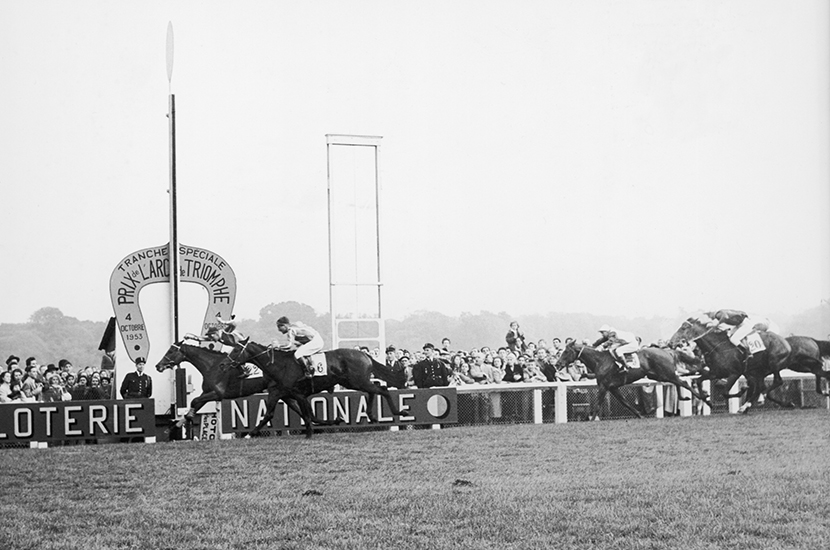Feeling oddly confident, clairvoyant even, I entered a bar to place a bet on Sunday’s Prix de l’Arc de Triomphe. I had researched the internet for advice on how to place a bet in France and I knew I wanted to bet on a couplé gagnant, that is to say make a prediction of the first two horses past the post. Feeling almost supernaturally confident, I thought I would follow up with a wilder bet called a trio ordre, adding a third horse from among the outsiders. Because my desire to bet large on a classic horse race was overwhelming, and my conviction that I would win grandiose, I think I was a bit off my head. Was this grandiosity perhaps a small manifestation of the vast irrational impulse that has apparently gripped the world?
As I passed through the door, I didn’t know whether I would be faced with a betting machine or a dedicated person sitting behind a betting counter. In either case I was banking on being guided through the process by a friendly face. There was neither. And unfortunately the flea market was on and the bar was noisy and crowded. Nobody was wearing a mask.
Judging by her air of surrender, the woman serving behind the bar’s first 40 years on earth had been characterized by unremitting servitude and toil and she was holding out little hope for an improvement. ‘Love! Enable!’ ‘Couplé gagnant,’ I shouted, trying to make myself heard above the hubbub. ‘Stradivarius! Love! Enable! Trio ordre!’ I mimed a child riding a rocking horse.
Recognition dawned across her tragic face. She pointed to the TV screen above her head showing horse racing. I screwed up my face trying to fathom her meaning. She stood on tiptoe, pointed to a row of numbers along the bottom of the screen, then to a rack of leaflets in the corner of the bar next to the toilet. Here I found some horse-race betting forms, took one and studied it madly. Rows of tiny numbers. Incomprehensible. Hopeless. I took it outside and sat at a table to try to decipher what the numbers represented.
A party of English at the next table were discussing COVID. They were all experts in virology. Then they got on to the subject of the forthcoming US election. Their knowledge of US politics was also comprehensive, their opinions trenchant. It struck me that the range of subjects one is expected to have an opinion about these days is amazing. What do you think of Black Lives Matter? COVID-19? President Trump? Global warming? Boris Johnson? Democracy? Colonialism? Social mobility? Brexit? Equality? Gender? China? J.K. Rowling’s latest tweet? You wonder how folk keep abreast of it all. Yet everybody seems to maintain a full awareness of all major problems, together with the knowledge of history, science, philosophy, geography, anthropology, technology, politics and comparative religion needed to discuss them. Surely they can’t all read The Spectator from cover to cover each week. I took my betting form over to their table and humbly showed it to them. Could they help?
Unfortunately, they knew everything except how to bet on a horse race in France. Three of them said they had never gambled in their lives, and in a tone of voice suggesting that neither were they sorry.
[special_offer]
Then I spotted Louis on the far side of the terrace. Louis is a canny Parisian who drinks, smokes, never has any money and talks about women a lot. Surely he must enjoy a flutter? ‘Jamais,’ he said, waggling a finger in front of his nose as if I’d asked him if he ever shoplifted. He looked at my unfilled betting card but refused to handle it. A bright idea occurred to him, however. Pointing to a chap sitting in the bar across the road, he said: ‘That man. He bets.’ So I took my card across the road and said to the chap in question: ‘Do you speak English?’ In a broad Geordie accent, he replied: ‘Kind of, mate.’
He didn’t know how to fill in the form either. ‘Yes, I do have a bet now and again,’ he said. ‘But I usually go in before the race and just point to a horse on the TV and someone hands me a ticket.’ He ran his eye over my betting card, pulling a nauseated face as if I’d shown him a photograph of a car accident.
‘Which race do you want to put your money on, anyhow?’ he said. I told him. Arc de Triomphe. One of his mates, another Geordie, said: ‘That’s next week, man.’ I checked on my phone. It was. I was exactly week early. Love, Enable, Stradivarius: if this clairvoyant feeling is still with me, I’ll try placing the treble again next Sunday — unless my spirit guide thinks otherwise.
This article was originally published in The Spectator’s UK magazine. Subscribe to the US edition here.


















